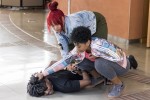Hip-hop theater performance “What It Iz!” is like a modern-day version of Shakespeare for Ayanna McKnight.
“Spoken word and poetry, in and of itself, go together,” said the third-year theater student. “It’s just a very artistic way to deal with something so serious.”
“What It Iz!”, presented by the UCLA department of African-American studies, opens Friday at the Los Angeles Theatre Center and offers a modernized critique of racial relations in America, providing the student actors a way to explore their own experiences with race and educate the community.
“What It Iz!” adapts the story of “The Wiz,” which is itself an adaptation of “The Wizard of Oz.” The show transforms the story for the modern day with rap and spoken-word poetry. Dorothy is sent from the disco era to the hip-hop era, where she encounters contemporary updates of familiar characters: an uninformed small-time hustler named Smooth, a rapper who longs for self-love named Platinum and a paranoid Black Panther named Assata.
The show addresses issues such as the mass disproportionate incarceration of black men and the privatization of prisons. The unusual format helps make the topics more relatable for young audiences, said Irvin Mason Jr., a first-year theater student and an actor in the show.
“It’s so poetic,” Mason said. “It has this specific rhyme or pattern or rhythmic feel to it that really gets the words out to the audience. The way how we present it is going to really keep the message in everyone’s heads of the different problems that we are going through right now.”
The self-described “spokenwordical” was originally performed in 2014 by the BlackOUT Arts Collective, a group founded by Bryonn Bain, a UCLA professor of African-American studies who is directing the UCLA production.
[Read more: The story of Bryonn Bain, arrested for a crime he didn’t commit]
In 2016, Bain worked with the creative writing workshop at the California Institute for Women, a women’s state prison in Corona, California. Through UCLA’s Prison Education Program, which offers concurrent enrollment to both inmates and UCLA students, Bain taught the seminar “African-American Studies C191: Narratives of Change” course, in which inmates worked and adapted the original script for “What It Iz!”, infusing the story with their own experiences, Bain said. UCLA students will premiere the adaptation in Friday’s show.
For example, the show engages with generational incarceration – parents locked up with their children. Some of the inmates had similar experiences and incorporated insight from their lives to add dimension to the script. The story’s foundation in reality increases the power of the story, McKnight said.
“The people behind this play that wrote it are important to telling the story,” McKnight said. “It’s straight from the mouths of these people.”
The process of putting on the show started in fall quarter for students. Mason attended a read-through of the script, where he was struck by a scene that used a spoken-word poem written by an inmate reflecting upon his time in jail.
“This is something I have to make sure that I’m a part of, to showcase to the community so that they can know what people are going through and how incarceration affects families,” Mason said. “That’s what drew me to the show – that real truth behind the piece.”
Mason said his involvement with the show helped him connect with the narrative of crimes and convictions in continental U.S., a narrative he felt distant from as someone from the Virgin Islands.
For instance, in one scene, Mason reads off a list of black men and women who faced injustice, featuring names like the Scottsboro Boys and the Central Park Five that were unfamiliar to him. Mason researched information on the various cases and people affected, which gave him more insight and changed the way he portrayed his character.
“I was just saying the words, and I didn’t know what they meant. I didn’t have any substance behind the names,” Mason said. “I had to know more to actually embody what the show is trying to portray to the audience. Reading the lines and having to submit myself to actually feeling like that makes me have a greater respect for what the families of these people go through and what these people actually go through.”
For McKnight, the character Smooth relates to her experiences with family members and friends who grew up in lower-income communities. Smooth is arrested for selling illegal cellphones in order to provide for his family. But upon his release, his inability to get a job forces him to return to the illegal activity. Smooth speaks to the cyclical relationship between life in resource-poor environments and incarceration, McKnight said.
“This narrative is real: It’s something that I can relate to,” McKnight said. “(Mason), as a black man, as my brother, can be affected by this, affected by injustices, just because of how he looks. Me, myself as a black woman, I’m portrayed a certain way because of how I look.”
McKnight said the play offered her a platform to share a message of resistance, awareness and understanding, something she hopes audiences will walk away with.
“Art is my voice,” McKnight said. “I’m not a politician, I’m not someone who’s poetic. Art is my way to relate to everyone around, and I think this play gets the message I want to say across.”
